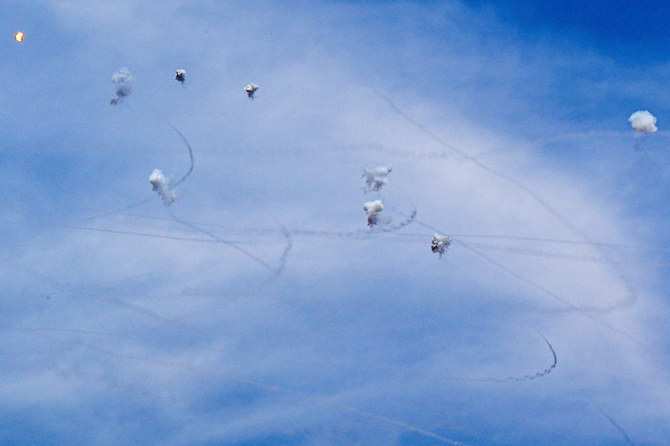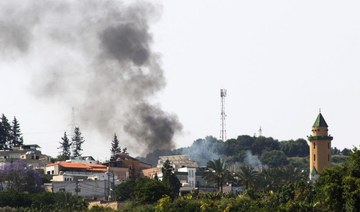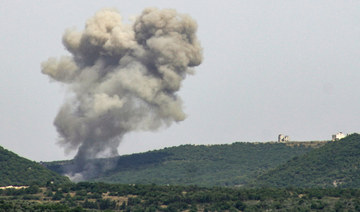SHTULA: A momentary shriek presages a bone-juddering blast, followed by a plume of thick black smoke. Refrigerator-sized holes mark where Hezbollah anti-tank missiles like this one have hit along Israel’s northern border.
Lebanese militant group Hezbollah has been exchanging near-daily cross-border fire with the Israeli army since Hamas’s unprecedented October 7 attack triggered war in Gaza.
The Iran-backed militants have launched thousands of rockets, mortar rounds, anti-tank missiles and attack drones at northern Israel.
The exchanges of fire have killed at least 11 civilians and 14 soldiers in Israel, according to the army.
At least 429 people have been killed in Lebanon, mostly militants but also including at least 82 civilians, according to an AFP tally.
The barrages have dealt a heavy blow to Israeli towns and villages near the border which have been evacuated for more than six months. They have also served as a warning of the far greater destruction that would be wrought by a full-blown war.
The Israeli defense ministry body responsible for rebuilding northern communities said it had received 930 reports of damage — around a third of them categorized as moderate to critical — the vast majority of it inflicted on residential buildings.
Hundreds more cases remain unassessed in towns like Arab Al-Aramsheh, Menara and Metula because it is considered too hazardous for inspectors to enter.
The report did not cite an estimated cost, but a senior defense official who spoke to AFP on condition of anonymity said reconstruction in the hardest hit locations could take months to a year.
In Kibbutz Menara, around 30 percent of buildings have suffered substantial damage, the official said.
At least 26 percent of the reported damage was caused by Israeli troops who have entrenched themselves in evacuated towns and villages along the 120-kilometer (75-mile) border, according to the Northern Horizon Directorate report.
The Israeli military said it “regrets any damage to the residents’ property” and is working to minimize damage as much as possible.
The most vulnerable communities were evacuated immediately after the outbreak of hostilities, displacing some 60,000 civilians. Access to them is restricted by the Israeli military.
But AFP reporters managed to visit Shtula, a village of 300 people sitting on the border that has 44 recorded cases of moderate to critical damage.
Although her neighbor’s house suffered a direct hit, and missiles pounded several other nearby buildings facing Lebanon, Ora Hatan, 60, is one of the few residents who has stayed on.
“An anti-tank missile flew over the chicken coop and right into the house,” said Hatan, pointing at a neighbor’s property.
“A direct hit. Fortunately, no one was home.”
Even after more than seven months of intense bombardment, Hatan won’t leave.
“It’s my house. It’s my land. It’s my country. Where would I go? Why should I go?” she told AFP on her balcony overlooking the Lebanese village of Raymeh two kilometers (little more than a mile) away.
As the war grinds on, and Hezbollah attacks show no sign of relenting, northern residents have grown weary of what many see as talk and little action.
For months, Defense Minister Yoav Gallant has said Israel will restore security — diplomatically or militarily. The two sides fought a devastating war in 2006.
Israel’s Channel 13 reported that National Security Adviser Tzachi Hanegbi told lawmakers Wednesday that “the cabinet hasn’t defined any clear objective concerning the north — not dates, not targets, not strategic aims.”
A poll published Thursday by Israel’s public broadcaster showed that 46 percent of respondents backed military action in Lebanon, while 29 percent opposed.
On Thursday, a few hundred activists set up a protest camp to demand urgent action to restore security and allow displaced residents to return to their homes in the north.
One of the organizers, Nisan Zeevi, lives in kibbutz Kfar Giladi and serves on its emergency response team.
Across the valley from his home, a fortified tower seven storys high looms over the kibbutzim in the valley below that have been frequent targets of drone and missile strikes.
A house in the neighboring kibbutz bears a gaping hole where a missile strike killed a woman and her son in January.
Zeevi said the camp aimed “to express our protest to the Israeli government and to the world until they find a solution to the severe security situation.”
Hezbollah barrages deal heavy damage in northern Israel
https://arab.news/zce69
Hezbollah barrages deal heavy damage in northern Israel

- The barrages have dealt a heavy blow to Israeli towns and villages near the border which have been evacuated for more than six months
- The Israeli defense ministry body responsible for rebuilding northern communities said it had received 930 reports of damage
22 dead in shelling of Sudan’s besieged El-Fasher: medic
A doctor at the city’s Saudi Hospital said “bombardment of the livestock market and the Redayef neighborhood killed 22 people and wounded 17“
PORT SUDAN: Besieging Sudanese paramilitary forces pounded El-Fasher on Saturday, witnesses said, killing 22 people in Darfur’s last city outside their control, according to a hospital source.
El-Fasher has become a key battleground in the 15-month-long war pitting the paramilitary Rapid Support Forces (RSF) against the regular army.
The battle for the North Darfur state capital, seen as crucial for humanitarian aid in a region on the brink of famine, has raged for more than two months.
Witnesses said El-Fasher had come under heavy artillery bombardment by the RSF on Saturday.
“Some houses were destroyed by the shelling,” one witness said.
A doctor at the city’s Saudi Hospital told AFP on condition of anonymity that “bombardment of the livestock market and the Redayef neighborhood killed 22 people and wounded 17.”
It was the deadliest reported bombardment since the start of the month, when 15 civilians were killed in the shelling of another city market.
Intense fighting for El-Fasher erupted on May 10, prompting a siege by the RSF that has trapped hundreds of thousands of civilians.
Last month, the UN Security Council passed a resolution demanding an end to the siege.
US mediators are to make a new attempt in Switzerland next month to broker an end to the fighting. The talks are due to open on August 14.
Previous negotiations in Jeddah, Saudi Arabia, have failed to put an end to the fighting which has displaced millions, sparked warnings of famine and left swathes of the capital Khartoum in ruins.
Egypt’s presence at Gaza talks highlights its ‘pivotal role’ in region, says analyst

- Meeting in Rome fuels hope amid concerns that Israel is sabotaging peace negotiations
CAIRO: The presence of Egyptian delegates at a scheduled meeting in Rome to discuss a ceasefire in Gaza underscores Cairo’s “pivotal role” in the region, political analyst and MP Osama Al-Ashmouni told Arab News on Saturday, adding that it also shows Egypt’s unquestionable commitment to the Palestinian cause.
Egypt — along with Qatar and the US — has been involved in months of mediation efforts aimed at ending the war that has raged in the Gaza Strip for more than nine months.
A senior source told the Cairo News Channel that a meeting involving Egyptian, US, and Qatari officials and the head of Israeli Intelligence will take place in Rome on Sunday, in the hopes of developing an agreement that would immediately halt military engagements and guarantee the entry of humanitarian aid into Gaza.
The source said Egyptian authorities have stressed the importance of reaching an agreement that ensures the free movement of Gaza’s citizens and a complete withdrawal from the Rafah crossing.
Al-Ashmouni told Arab News that Egypt “has been a stalwart supporter of the Palestinian cause throughout its history, offering tremendous support to defend the rights of the Palestinian people and their quest to reclaim their occupied land and establish a Palestinian state.”
Al-Ashmouni added that Israel “consistently disseminates falsehoods and continues its deceptive practices and lies, whether in distorting Egypt’s role in supporting the Palestinian cause or by trying to portray itself as the victim, thereby reversing the roles of victim and perpetrator.
“It is crucial for attendees at the Rome meeting to recognize this, as the conscience of the free world should not heed the fabrications spread by the Israeli propaganda machine, despite the international community’s passive stance on Israel’s actions, which include crimes against humanity and war crimes against the unarmed Palestinian people in Gaza.”
Al-Ashmouni expressed his hope that the negotiations in Rome would prove effective, although he anticipates that Israel will continue what he called its policy of sabotaging peace negotiations.
Journalist Mahmoud Mosalam, a member of the Egyptian Senate, told Arab News that Egypt plays a crucial role in mediation talks amid “intense accusations by Israel and other parties who would prefer Egypt to withdraw from the role.”
Mosalam added: “They allege that Egypt is facilitating arms smuggling to the resistance, and some American media outlets falsely claim that Egypt has altered texts from previous negotiations.”
He hopes the negotiations in Rome, which will also include Palestinian and Italian officials, “will be fruitful and help Gaza emerge from its severe crisis, a situation akin to actual genocide.”
He added that the recent outpouring of global support for the Palestinian people gives them an opportunity that they must seize and said it is inevitable the war will end, which would present the Palestinian leaders with “significant responsibilities,” including the reconstruction of Gaza and the reorganization of the Palestinian administration in preparation for a “comprehensive resolution” of the Palestinian issue.
Heat wave forces Iran to shutter government offices and banks. Electricity consumption soars

- Banks, offices, and public institutions across the country close to protect people’s health and conserve energy, due to extreme temperatures
TEHRAN: A heat wave blanketing Iran has forced authorities to cut operating hours at various facilities Saturday and order all government and commercial institutions to shutter on Sunday.
The temperature ranged from 37 degrees Celsius (98.6 degrees Fahrenheit) to 42 C (about 107 F) in the capital, Tehran on Saturday, according to weather reports.
State-run IRNA news agency said banks, offices, and public institutions across the country would close on Sunday to protect people’s health and conserve energy, due to extreme temperatures and that only emergency services and medical agencies would be excluded.
Authorities also cut working hours on Saturday in many provinces due to the sweltering heat, IRNA reported, adding that high temperatures, over 40 C (104 F), have been registered in Tehran since Friday.
Iranian media warned people to stay indoors until 5 p.m. local time.
Authorities also said electricity consumption reached record levels of 78,106 megawatts on Tuesday.
Nournews, close to Iran’s Supreme National Security Council, reported Wednesday that Iran’s temperature is rising at twice the pace of the global temperature which has increased by more than one degree compared to the long-term average. Meanwhile, Iran has become warmer by 2 degrees over the past 50 years, the agency said.
Last year, Iran ordered a two-day nationwide holiday due to increasing temperatures.
170 killed in days-long Israeli operation, says Gaza civil defense

- Deir Al-Balah is one of the areas most populated with displaced families, and said over 100 others were wounded
GAZA: Gaza’s civil defense agency said Saturday that Israel’s military operation around Khan Yunis has killed about 170 people and wounded hundreds since it started on Monday.
“Since the beginning of the Israeli military operation in the Khan Yunis area, we are talking of approximately 170 martyrs and hundreds of wounded,” agency spokesman Mahmud Bassal told AFP.
He said many people had been displaced again on Saturday as the Israeli operation continued.
“The questions is where will these residents go?” Basal said.
“Anyone who sees the situation in Khan Yunis will witness thousands of people spread out on the ground, on the roads, in areas that unfortunately are not suitable for living.
“With no other options available, they are exposing themselves to death.”
Earlier on Saturday the military issued new evacuation orders for residents of the southern city, after retrieving the bodies of five Israelis and warning of new operations.
The United Nations said more than 180,000 Palestinians have fled Khan Yunis since the Israeli operation began on Monday.
The evacuation orders and “intensified hostilities” have “significantly destabilized aid operations,” it added, reporting “dire water, hygiene and sanitation conditions” across the Palestinian territory.
The Israeli military said it launched the operation to halt rocket fire from the area, which already saw heavy fighting earlier this year.
On Wednesday, it said troops had retrieved the bodies of five Israelis from the area.
They had been killed during the Hamas attacks of October 7 and their bodies taken back to Gaza, the military said.
On Saturday, it ordered residents from more parts of Khan Yunis “to temporarily evacuate to the adjusted humanitarian area in Al-Mawasi” — the second such adjustment made to the safe zone within a week.
Israel orders the evacuation of an area designated as a humanitarian zone in Gaza

- The war in Gaza has killed more than 39,100 Palestinians, according to the territory’s Health Ministry
KHAN YOUNIS: Israel’s military ordered the evacuation Saturday of a crowded part of Gaza designated as a humanitarian zone, saying it is planning an operation against Hamas militants in Khan Younis, including parts of Muwasi, a makeshift tent camp where thousands are seeking refuge.
The order comes in response to rocket fire that Israel says originates from the area. It’s the second evacuation issued in a week in an area designated for Palestinians fleeing other parts of Gaza. Many Palestinians have been uprooted multiple times in search of safety during Israel’s punishing air and ground campaign.
On Monday, after the evacuation order, multiple Israeli airstrikes hit around Khan Younis, killing at least 70 people, according to Gaza’s Health Ministry, citing figures from Nasser Hospital.
The area is part of a 60-square-kilometer (roughly 20-square-mile) “humanitarian zone” to which Israel has been telling Palestinians to flee to throughout the war. Much of the area is blanketed with tent camps that lack sanitation and medical facilities and have limited access to aid, United Nations and humanitarian groups say. About 1.8 million Palestinians are sheltering there, according to Israel’s estimates. That’s more than half Gaza’s pre-war population of 2.3 million.
The war in Gaza has killed more than 39,100 Palestinians, according to the territory’s Health Ministry, which doesn’t distinguish between combatants and civilians in its count. The UN estimated in February that some 17,000 children in the territory are now unaccompanied, and the number is likely to have grown since.
The war began with an assault by Hamas militants on southern Israel on Oct. 7 that killed 1,200 people, most of them civilians, and took about 250 hostages. About 115 are still in Gaza, about a third of them believed to be dead, according to Israeli authorities.


















